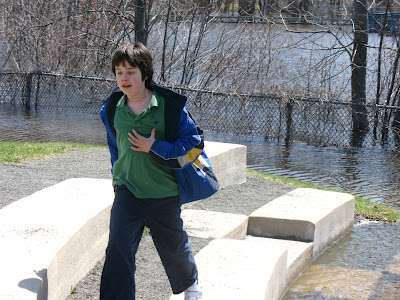This winter Stefan walked for 11 days, over more than 200 miles, from Toronto to Ottawa, in the middle of a tough Canadian winter, blizzards and all, in an effort to meet Alleged Health Minister Tony Clement to ask the Canadian government to do something to help autistic people in Canada. He was traveling on foot with no warm trailer to retire to at the end of the day or if things got rough. With his winter autism trek Stefan literally put his life on the line advocating for autism change. Stefan got a 15 minute meeting with Minister Clement who said very little of substance. While the alleged federal Health Minister was not moved by Stefan's efforts parents of autistic loved ones across Canada were very moved. It was a privilege for me to meet Stefan in Toronto and Oakville. He is a genuine and compassionate person and has a great family.
Stefan's daughter Lia has started a Facebook group HUNGERSTRIKE for AUTISM NOW on which you will find updates and information about Stefan's Hunger Strike for Autism Now. As Lia points out her father is a type-2 diabetic. His hunger strike again poses serious risks to Stefan's health. Stefan's willingness to put it on the line for autism is a reflection of his tremendous personal courage and his strong convictions. It also reflects his frustration with the lack of help for autistic people like his son, 15 year old Simon, as shown in this Toronto Sun video:
Stefan's daughter Lia has started a Facebook group HUNGERSTRIKE for AUTISM NOW on which you will find updates and information about Stefan's Hunger Strike for Autism Now. As Lia points out her father is a type-2 diabetic. His hunger strike again poses serious risks to Stefan's health. Stefan's willingness to put it on the line for autism is a reflection of his tremendous personal courage and his strong convictions. It also reflects his frustration with the lack of help for autistic people like his son, 15 year old Simon, as shown in this Toronto Sun video:
I hope that Stefan takes care of himself as he tries again to impress upon government and public decision makers the impact that autism is having on autistic persons and their families and the need to take serious action to address Canada's autism crisis.




































